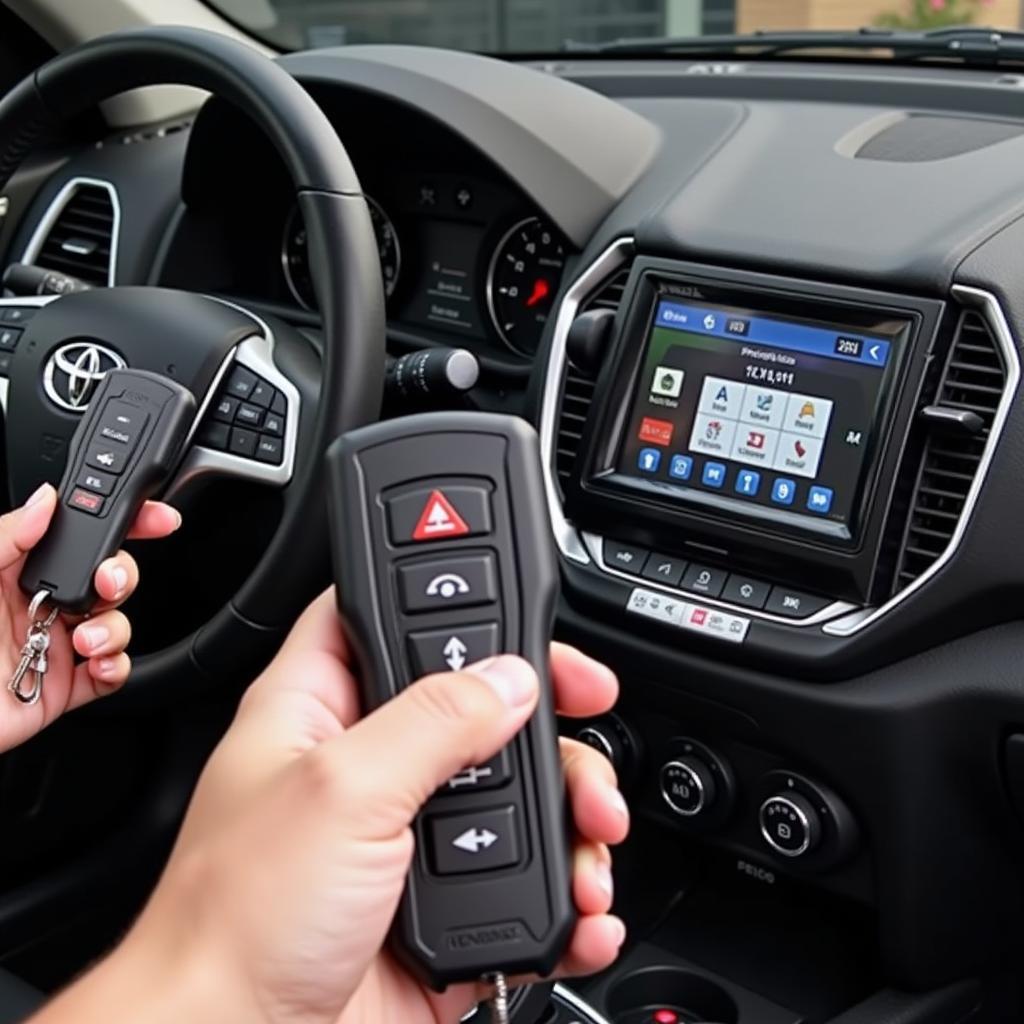In the ever-evolving world of automotive technology, the Electronic Throttle Control (ETC) system has become a mainstay in modern vehicles. This sophisticated system replaces the traditional mechanical linkage between the accelerator pedal and the throttle body, utilizing electronic sensors and actuators for precise throttle control. While offering numerous benefits like improved fuel efficiency and smoother acceleration, the ETC system can sometimes throw a curveball with its intricate electronics. That’s where an Etc Scan Tool comes in, proving to be an indispensable asset for mechanics and car enthusiasts alike.
[image-1|etc-scan-tool-in-action|Mechanic using an ETC scan tool to diagnose a car|A mechanic in a busy auto repair shop is shown connecting an ETC scan tool to a car’s OBD-II port. The tool’s display screen is illuminated, showcasing live data streams and diagnostic information related to the vehicle’s electronic throttle control system.]
An ETC scan tool, specifically designed to interact with the electronic throttle control system, allows you to delve deep into the system’s operations, read and clear fault codes, and even perform advanced functions like actuator tests and system calibrations. Whether you’re a seasoned mechanic or a car owner who likes to tinker under the hood, having a reliable ETC scan tool in your arsenal can save you time, money, and unnecessary headaches.
Why Do You Need an ETC Scan Tool?
You might be thinking, “My car runs fine, why would I need a specialized tool for the throttle?” Well, the ETC system, like any electronic component, can experience glitches and malfunctions that can manifest as:
- Illuminated Check Engine Light: This is often the first sign that something’s amiss with your ETC system.
- Reduced Engine Power: A faulty ETC system can send the car into “limp mode,” severely limiting engine power for safety reasons.
- Rough Idling or Stalling: Inconsistent throttle control due to ETC issues can lead to an unstable idle or even stalling.
- Poor Acceleration: If the throttle body isn’t responding correctly to your pedal input, you’ll likely experience sluggish acceleration.
[image-2|car-dashboard-with-check-engine-light|Car dashboard showing a check engine light|A close-up photo of a car’s dashboard with the “check engine” light illuminated, indicating a potential problem with the vehicle’s engine or related systems.]
An ETC scan tool allows you to quickly identify the root cause of these problems by reading the diagnostic trouble codes (DTCs) stored in your car’s Engine Control Unit (ECU). Instead of playing a guessing game, you can pinpoint the faulty sensor, actuator, or wiring issue, making repairs more efficient and cost-effective.
Choosing the Right ETC Scan Tool
Not all ETC scan tools are created equal. They come with a wide range of features and capabilities, from basic code readers to advanced diagnostic tools. When choosing an ETC scan tool, consider the following:
- Vehicle Compatibility: Ensure the scan tool is compatible with your vehicle’s make, model, and year.
- Functionality: Determine the features you need, such as reading and clearing codes, viewing live data, performing actuator tests, and resetting the throttle position sensor.
- User-Friendliness: Opt for a scan tool with an intuitive interface, easy-to-understand menus, and clear instructions.
- Durability and Build Quality: A robust and well-built scan tool can withstand the rigors of regular use in a workshop or garage.
- Budget: Set a realistic budget and explore the options within your price range.
For basic diagnostics and code reading, an affordable [ancel fx2000 vehicle obd2 scanner automotive car code reader] might suffice. However, professional mechanics dealing with a wide range of vehicles often invest in high-end scan tools offering advanced features and bi-directional control.
Beyond Diagnostics: Additional Benefits of ETC Scan Tools
Besides troubleshooting ETC system issues, these versatile tools offer additional benefits:
- Preventive Maintenance: Regularly scanning your ETC system allows you to detect potential problems early on, preventing costly repairs down the road.
- Performance Tuning: Some advanced ETC scan tools enable adjustments to the throttle response curve, allowing for a more responsive or fuel-efficient driving experience.
- DIY Repairs: With the right knowledge and an ETC scan tool, you can perform some repairs yourself, saving on labor costs at the mechanic.
“An ETC scan tool is like having an X-ray vision into your car’s electronic throttle system,” says John Miller, a veteran automotive engineer. “It empowers you with the information you need to diagnose problems accurately and efficiently, saving you both time and money in the long run.”
Common ETC Scan Tool Functions
Here’s a glimpse of some typical functions you’ll find in an ETC scan tool:
- Read and Clear Codes: Retrieve and clear DTCs stored in the ECU, providing insights into the nature of the problem.
- Live Data Stream: Monitor real-time data from various sensors within the ETC system, such as throttle position, accelerator pedal position, and air intake temperature.
- Actuator Tests: Command the throttle body to open and close, allowing you to verify its functionality and identify potential mechanical issues.
- Throttle Position Sensor Reset: After replacing the throttle position sensor, you can use the scan tool to recalibrate it to the ECU.
[image-3|mechanic-performing-actuator-test-with-etc-scan-tool|Mechanic using an ETC scan tool to perform an actuator test|A mechanic is using an ETC scan tool to conduct an actuator test on a vehicle. The tool’s screen displays the command being sent to the actuator and the real-time response from the component.]
Conclusion
As vehicles become increasingly reliant on complex electronic systems, having the right diagnostic tools is no longer optional but essential. An ETC scan tool is a valuable investment for anyone who owns, maintains, or repairs modern cars. It empowers you with the knowledge and capability to keep your vehicle running smoothly, efficiently, and safely.
For expert advice on choosing the right ETC scan tool for your needs, contact ScanToolUS at +1 (641) 206-8880 or visit our office at 1615 S Laramie Ave, Cicero, IL 60804, USA. We’re here to help you navigate the world of automotive diagnostics!

